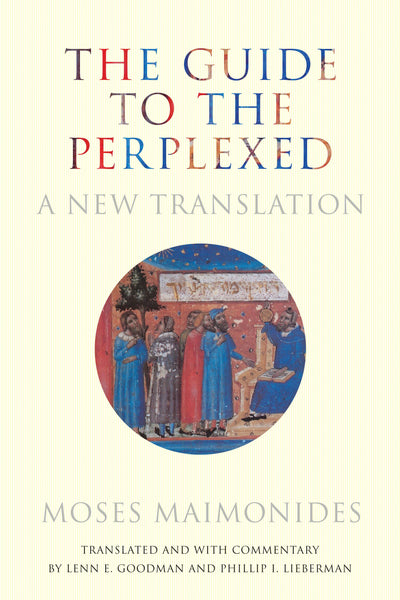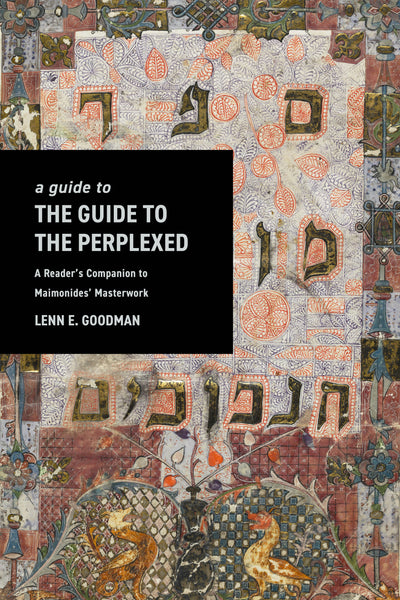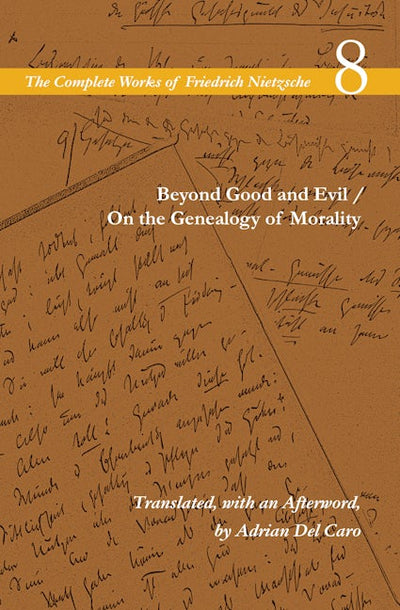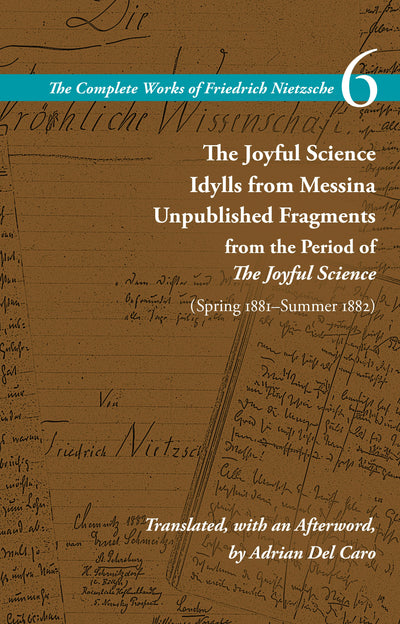You may also like
The Guide to the Perplexed
Regular price $50.00 Save $-50.00A landmark new translation of the most significant text in medieval Jewish thought.
Written in Arabic and completed around 1190, the Guide to the Perplexed is among the most powerful and influential living texts in Jewish philosophy, a masterwork navigating the straits between religion and science, logic and revelation. The author, Rabbi Moses ben Maimon, commonly known as Maimonides or as Rambam, was a Sephardi Jewish philosopher, jurist, and physician. He wrote his Guide in the form of a letter to a disciple. But the perplexity it aimed to cure might strike anyone who sought to square logic, mathematics, and the sciences with biblical and rabbinic traditions. In this new translation by philosopher Lenn E. Goodman and historian Phillip I. Lieberman, Maimonides' warm, conversational voice and clear explanatory language come through as never before in English.
Maimonides knew well the challenges facing serious inquirers at the confluence of the two great streams of thought and learning that Arabic writers labeled 'aql and naql, reason and tradition. The aim of the Guide, he wrote, is to probe the mysteries of physics and metaphysics. But mysteries, to Maimonides, were not conundrums to be celebrated for their obscurity. They were problems to be solved.
Maimonides' methods and insights resonate throughout the work of later Jewish thinkers, rationalists, and mystics, and in the work of philosophers like Thomas Aquinas, Spinoza, Leibniz, and Newton. The Guide continues to inspire inquiry, discovery, and vigorous debate among philosophers, theologians, and lay readers today. Goodman and Lieberman's extensive and detailed commentary provides readers with historical context and philosophical enlightenment, giving generous access to the nuances, complexities, and profundities of what is widely agreed to be the most significant textual monument of medieval Jewish thought, a work that still offers a key to those who hope to harmonize religious commitments and scientific understanding.

The Burnout Society
Regular price $14.00 Save $-14.00Our competitive, service-oriented societies are taking a toll on the late-modern individual. Rather than improving life, multitasking, "user-friendly" technology, and the culture of convenience are producing disorders that range from depression to attention deficit disorder to borderline personality disorder. Byung-Chul Han interprets the spreading malaise as an inability to manage negative experiences in an age characterized by excessive positivity and the universal availability of people and goods. Stress and exhaustion are not just personal experiences, but social and historical phenomena as well. Denouncing a world in which every against-the-grain response can lead to further disempowerment, he draws on literature, philosophy, and the social and natural sciences to explore the stakes of sacrificing intermittent intellectual reflection for constant neural connection.

A Guide to The Guide to the Perplexed
Regular price $26.00 Save $-26.00In this volume, noted philosopher Lenn E. Goodman shares the insights gained over a lifetime of pondering the meaning and purpose of Maimonides' celebrated Guide to the Perplexed. Written in the late twelfth century, Maimonides' Guide aims to help religiously committed readers who are alive to the challenges posed by reason and the natural sciences to biblical and rabbinic tradition. Keyed to the new translation and commentary by Lenn E. Goodman and Phillip I. Lieberman, this volume follows Maimonides' life and learning and delves into the text of the Guide, clearly explaining just what Maimonides means by identifying the Talmudic Ma'aseh Bereshit and Ma'aseh Merkavah with physics and metaphysics (to Maimonides, biblical cosmology and theology). Exploring Maimonides' treatments of revelation, religious practice and experience, law and ritual, the problem of evil, and the rational purposes of the commandments, this guide to the Guide explains the tactics Maimonides deployed to ensure that readers not get in over their heads when venturing into philosophical deep waters.

Beyond Good and Evil / On the Genealogy of Morality
Regular price $26.00 Save $-26.00Beyond Good and Evil is Nietzsche's first sustained philosophical treatment of issues important to him. Unlike the expository prose of the essayistic period (1872-76), the stylized forays and jabs of the aphoristic period (1878-82), and the lyrical-philosophical rhetoric of the Zarathustra-period (1882-85), Beyond Good and Evil inscribes itself boldly into the history of philosophy, challenging ancient and modern notions of philosophy's achievements and insisting on a new task for "new philosophers." This is a watershed book for Nietzsche and for philosophy in the modern era. On the Genealogy of Morality applies Nietzsche's celebrated genealogical method, honed in the earlier aphoristic writings, to the problem of morality's influence on the human species. In three treatises that strikingly anticipate insights appearing much later in Freud's Civilization and Its Discontents (1930), Nietzsche provides an anthropological psychograph of our species, revealing the origins of the concepts of good and evil, the roles played by guilt and bad conscience, and the persistence of ascetic ideals. Manifesting a hopeful yet unsentimental assessment of the human condition, these books resonated throughout the 20th century and continue to exert broad appeal.

The Joyful Science / Idylls from Messina / Unpublished Fragments from the Period of The Joyful Science (Spring 1881–Summer 1882)
Regular price $28.00 Save $-28.00Written on the threshold of Thus Spoke Zarathustra during a high point of social, intellectual and psychic vibrancy, The Joyful Science (frequently translated as The Gay Science) is one of Nietzsche's thematically tighter books. Here he debuts and practices the art of amor fati, love of fate, to explore what is "species preserving" in relation to happiness (Book One); inspiration and the role of art as they keep us mentally fit for inhabiting a world dominated by science (Book Two); the challenges of living authentically and overcoming after the death of God (Book Three); and the crescendo of life affirmation in which Nietzsche revealed the doctrine of eternal recurrence and previewed the figure of Zarathustra (Book Four). Invigorated and motivated by Thus Spoke Zarathustra and Beyond Good and Evil, Nietzsche in 1887 added a new preface, an appendix of poems, and Book Five, where he deepened the critique of science and displayed a more genealogical approach.
This volume provides the first English translation of the Idylls from Messina and, more importantly, it includes the first English translation of the notebooks of 1881–1882, in which Nietzsche first formulated the eternal recurrence. Structurally and stylistically, The Joyful Science remains Nietzsche's most effective book of aphorisms, immediately after which he took on the voice and alter ego of Zarathustra in order to push beyond the boundaries of even the most liberating prose.

The Case of Wagner / Twilight of the Idols / The Antichrist / Ecce Homo / Dionysus Dithyrambs / Nietzsche Contra Wagner
Regular price $26.00 Save $-26.00The year 1888 marked the last year of Friedrich Nietzsche's intellectual career and the culmination of his philosophical development. In that final productive year, he worked on six books, all of which are now, for the first time, presented in English in a single volume. Together these new translations provide a fundamental and complete introduction to Nietzsche's mature thought and to the virtuosity and versatility of his most fully developed style.
The writings included here have a bold, sometimes radical tone that can be connected to Nietzsche's rising profile and growing confidence. In The Antichrist, we are offered an extended critique of Christianity and Christian morality alongside blunt diagnoses of contemporary Europe's cultural decadence. In Dionysus Dithyrambs we are presented with his only work composed exclusively of poetry, and in Twilight of the Idols we find a succinct summary of his mature philosophical views. At times the works are also openly personal, as in The Case of Wagner, which presents Nietzsche's attempt to settle accounts with his former close friend, German composer Richard Wagner, and in his provocative autobiography, Ecce Homo, which sees Nietzsche taking stock of his past and future while also reflecting on many of his earlier texts.
Scrupulously edited, this critical volume also includes commentary by esteemed Nietzsche scholar Andreas Urs Sommer. Through this new collection, students and scholars are given an essential introduction to Nietzsche's late thought.







